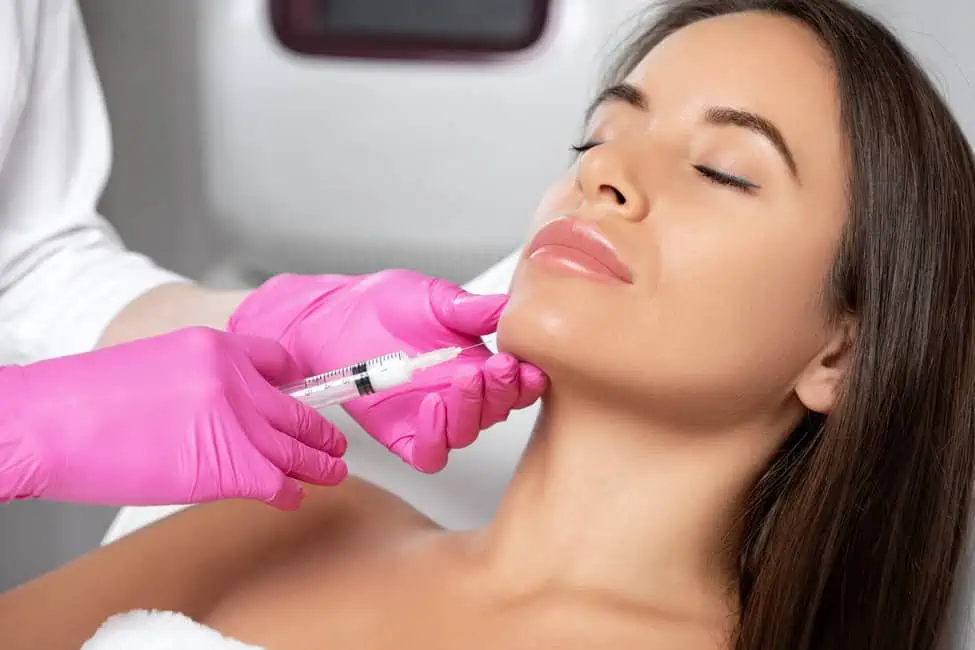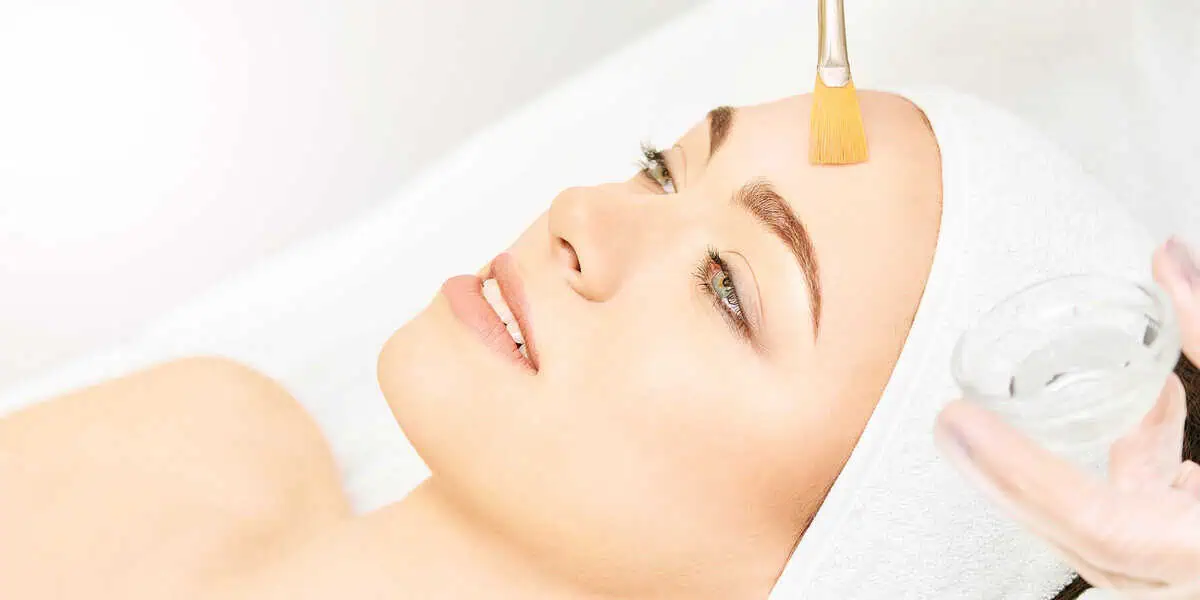
Table of Contents
Does your skin sting, burn, or become blotchy with the slightest change in product or temperature? If so, the thought of a chemical peel might sound more alarming than appealing.
We prepared this guide to help explore how patients with sensitive skin can benefit from chemical peels. This post will help you understand safe chemical peels, how to determine the ideal chemical peel frequency, and the best treatment options designed to deliver results without irritation.
Understanding the Role of Chemical Peels in Skincare
Chemical peels work by applying a solution of acids to the skin. This effectively exfoliates the uppermost layers. The gentle skin exfoliation leads to the following outcomes:
- Encourages new skin cell turnover
- Helps to reduce blemishes
- Fades scars
- Smooths fine lines
- Evens out pigmentation.
For patients with sensitive skin, this process must be carefully calibrated to prevent irritation and long-term barrier damage.
Sensitive skin often reacts negatively to harsh treatments, so safe chemical peels must be selected based on their formulation, pH level, and delivery method. When managed correctly, they can offer both cosmetic improvement and therapeutic benefits.
How Often Is Too Often? Finding the Right Chemical Peel Frequency
The biggest mistake individuals with sensitive skin can make is over-exfoliation. The outer layer of skin (the epidermis) needs time to recover and regenerate after each treatment.
For chemical peels for sensitive skin, the recommended frequency is:
- Every 6 to 8 weeks for medium-depth peels
- Every 4 to 6 weeks for superficial/light peels, only if tolerated well
Always allow your skin to fully recover and monitor for any signs of prolonged redness, dryness, or inflammation. If these symptoms persist, extending the time between sessions or switching to a gentler formula may be necessary.
Best Sensitive Skin Peels to Consider
Not all peels are created equal. Below are three standout options that strike the perfect balance between effectiveness and gentleness for sensitive skin types.
Perfect Derma Peel
Unveil your skin’s natural beauty with the Perfect Derma Peel. This advanced blend of ingredients is suitable for all skin types and tones, including sensitive ones.
The peel also combines TCA, retinoic acid, salicylic acid, kojic acid, and vitamin C to target signs of aging, hyperpigmentation, and texture concerns.
The Perfect Derma Peel provides visible rejuvenation without harsh irritation. It even supports collagen production for firmer skin and helps correct uneven skin tone with a well-rounded approach.
VI Peel
Elevate your skincare game with the VI Peel. Tailored to improve acne, sun damage, melasma, and fine lines, the VI Peel is a medium-depth option that balances potency with skin-loving ingredients like vitamin C and TCA.
This specific peel is effective for multiple skin concerns. The VI peel is also formulated for sensitive and ethnic skin types and promotes a more even complexion and smoother texture.
BioRePeel
Dive into the next generation of skin peeling with BioRePeel. Ideal for sensitive skin, BioRePeel uses a biphasic technology that exfoliates and nourishes simultaneously.
This innovative chemical peel contains amino acids and vitamins that hydrate the skin. In several instances, this feature offers minimal downtime with maximum glow and encourages skin regeneration without causing visible peeling.
Benefits of Chemical Peels at a Glance
- Improves skin tone and texture – This benefit comes from encouraging healthy cell turnover, revealing smoother and more even skin.
- Minimizes fine lines and wrinkles – Chemical peels can stimulate collagen and elastin production. This quality helps to reduce the appearance of aging signs.
- Brightens dull complexion – By removing dead skin cells, peels uncover a fresher and more radiant skin surface.
- Reduces acne and blemishes – These treatments clear out clogged pores and help control excess oil, reducing breakouts.
- Fades dark spots and hyperpigmentation – Regular use can help distribute melanin more evenly, improving overall skin tone.
- Softens acne scars – Over time, peels can smooth out textural irregularities and reduce the visibility of scars.
- Enhances product absorption – After exfoliation, your skincare products penetrate more effectively for better results.
How to Safely Prepare and Recover from a Peel
Before the Peel:
- Avoid retinoids and exfoliants for at least 5 days
- Disclose any skin conditions or medications to your provider
- Hydrate your skin and avoid prolonged sun exposure
After the Peel:
- Use a gentle, non-irritating cleanser
- Moisturize generously to support healing
- Apply sunscreen religiously (SPF 30 or higher)
- Refrain from picking or peeling flaking skin
Sensitive skin requires a nurturing approach. It’s not just about the chemical peel frequency, but also how you prepare and care for your skin before and after.
Fluid Hydration and Wellness: Trusted Chemical Peel Services in Charlotte, NC
For residents of Charlotte, NC, Fluid Hydration and Wellness offers expert chemical peel services in Charlotte, NC. Each is specifically tailored for every skin type—especially sensitive skin.
Whether you’re dealing with signs of aging, acne scars, or pigmentation concerns, our treatments are designed to safely exfoliate dead skin layers and reveal a refreshed, vibrant complexion.
Here’s what you can expect:
- Safe, effective chemical exfoliation
- Minimal downtime with visible improvement in skin clarity and texture
- A professional evaluation to determine your ideal chemical peel frequency
With treatments like the Perfect Derma Peel, VI Peel, and BioRePeel, Fluid Hydration and Wellness brings science-backed skincare solutions to clients who seek results without compromise. Plus, the effects of your peel can last for months when paired with a proper skincare regimen.
Sensitive skin? Get tips on safe chemical peel schedules here!
Frequently Asked Questions
How often should I get a chemical peel if I have sensitive skin?
You should typically wait 6 to 8 weeks between peels to allow your skin to heal properly.
Can I use at-home chemical peels if I have sensitive skin?
It is safer to get professional treatments of our team to ensure proper formulation and application.
Will my skin peel visibly after a sensitive skin peel?
Some peels may cause light flaking, but many modern formulations like BioRePeel do not.
Are chemical peels safe for people with rosacea or eczema?
Only very gentle, professionally supervised peels should be considered for those conditions.
How long do results from a chemical peel typically last?
Results can last several months with proper aftercare and sun protection.






